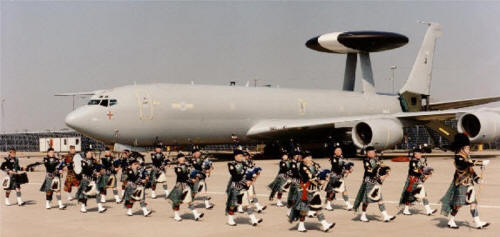The Pipes and Drums have been part of the fabric of our station for so long now it's good to look back and see how it all started.
There has always been a long tradition of piping and drumming in the Royal Air Force, bands formed throughout the UK and overseas, Singapore, Egypt, Cyprus and Germany to name but a few locations. Every year Boy Entrant and Apprentice Units at Saint Athan, Halton and Cosford churned out trained pipers and drummers in great numbers and they spread their music far and wide.
The County of Lincolnshire has never been closely associated with the Great Highland Bagpipe. Never, that is since the far sighted William Shakespeare's allusion to the "drone of a Lincolnshire Bagpipe" in his King Henry IV Part I.
In January 1967, however, the threads of the story were taken up where the Bard left off, and the newly formed No 1 group Pipe Band began to show its face and voice to the world. The band was an amalgamation of the RAF Scampton and RAF Waddington pipe bands which had formed independently in September 1965.
The new No 1 (Bomber) Group Pipe Band adopted the Full Highland Dress with a Montrose style doublet in RAF blue barathea with light blue facings. The kilt and plaid chosen was the Hunting MacIntyre tartan, fittingly a mixture of blue and green colours. Permission to wear the tartan was granted by the then Chieftain of the House of Camus-na-h-erie of the Clan MacIntyre. The band also adopted the Clan motto which is, significantly for a RAF band, 'Per Ardua'.
The Band Officer and main force behind the establishment and funding of the band was a piper, Flt Lt. Keith Knight from 101 Sqn at Waddington. It was mainly due to the hard work and effort on Keith Knight's part all those years ago that piping and drumming have become an integral part of RAF Waddington. Keith also established the first World's Bagpipe Altitude record of 43,000 feet in a Vulcan bomber.
In September 1967 the RAF Finningley pipe band was absorbed into the 1Group band. That first summer the band carried out over 30 engagements and parades, the climax of the 1967 season was leading the march past at the Nijmegen festival in front of the Dutch Royal Family and an audience of millions.
1968 was a very significant year, it was the 50th anniversary of the formation of the Royal Air Force and Bomber Command was amalgamated with Fighter Command to form Strike Command. The band became No 1 Group (Strike Command) Pipe Band and during the Vulcan era at Waddington the band and its members enhanced their reputation with performances in the USA, Canada, the Far East and Europe.
With the demise of the Vulcan fleet the station changed roles and left 1 Group, the band was renamed and became the RAF Waddington Pipe Band. Aircraft and personnel changed as part of 2 Group but the band played on.
In 1986 Pipe Major Alex Stewart was appointed by the MOD to become a full time instructor to the Waddington band. In his time in post Alex raised the standard of piping and drumming to a new high, not only here but throughout the RAF as a whole. He was a very well known figure in army and civilian piping circles he sadly passed away in 2003 but his memory lives on.
In 2004 the band took a huge leap forward following the appoint of our current Pipe Major, Finlay (Hammer Fingers) MacGhee, he has raised the bar to a new level, competing on the pipe band competition circuit with a great deal of success as well as playing at service functions, tattoos and parades at home and abroad.
The Waddington Pipes and Drums has, along with other units, recently adopted the Royal Air Force tartan. It was designed by Arthur Mackie and approved by the RAF Pipe Band Association in 2002 when it was formally recognised as the Royal Air Force Tartan. The particular colours can be interpreted in many ways, light and dark blues reflect the changing moods of the sky, white stripes for the clouds and a red stripe in recognition of all those who gave their lives while serving in the RAF.
Indeed as all of the three services shrink in size bands like ours are increasingly being called on to carry out ceremonial functions normally provided by full time bands.
The station possesses a strong and vibrant band so if you would like to join our happy group and help to continue the piping, drumming and highland dancing traditions at RAF Waddington then contact the Pipe Major at the band room, you'll be made to feel very welcome.

